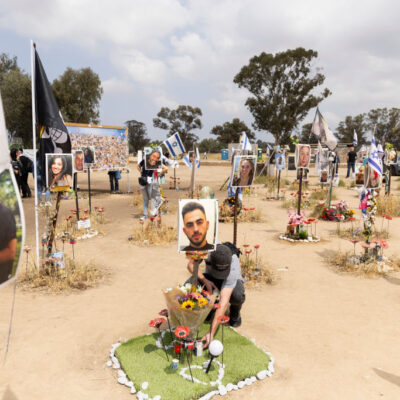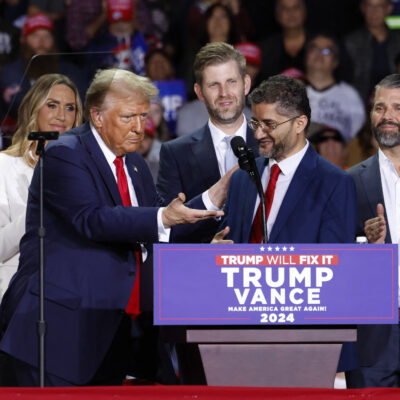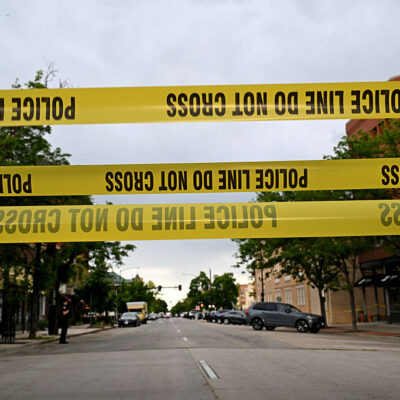
C Spot Media
The Israeli minister at the forefront of international right-wing populism
In an interview with JI, Diaspora Affairs Minister Amichai Chikli discusses his quest for allies around the world whom he views as being on Israel’s side of what he sees as a civilizational struggle
For decades, the name “Le Pen” evoked images for French Jews of a harsh anti-immigrant, nativist political leader, trafficking in antisemitism. Yet in this month’s election, prominent members of the French Jewish community said they would prefer the National Rally of Marine Le Pen – who has renounced her father Jean-Marie’s views on Jews and the Holocaust – over the anti-Israel far left, whose leader, Jean-Luc Melenchon, has repeatedly made antisemitic statements.
Amichai Chikli, Israel’s minister of diaspora affairs and combating antisemitism, has shown far more enthusiasm about Le Pen — and political parties with similar positions in Hungary, the Netherlands, Spain, Portugal, Sweden and beyond — than the Jewish communities in those countries. To Chikli, their values are aligned with Israel’s and they are the Jewish state’s new front-line allies in what he sees as a civilizational struggle, one that has only intensified since Hamas’ attack on Oct. 7 and Israel’s retaliatory war in Gaza.
That “metaphysical battle,” Chikli told Jewish Insider earlier this month, is “between the faith of Israel that values life, the pursuit of truth, and free choice” and radical elements of “a religion where Muhammad’s word was spread by the sword, it’s ‘my way or the highway.’” Reaching into Western culture war issues such as moral relativism and gender politics, Chikli said the battle is also “against the progressive religion that denies the existence of truth and … glorifies gender fluidity.”
“It’s the red-green alliance” – between socialists and Islamists – “against the Judeo-Christian world,” Chikli added.
Rather than follow the path of his predecessors in the job and combat antisemitism mainly by supporting Diaspora communities and their organizations and following their cues, Chikli has been jetting across the Western world to look for allies who are not Jewish but are on what he views as Israel’s side in the struggle.
Chikli has expressed support for former President and Republican nominee Donald Trump. A photo of Chikli with Le Pen, with a tweet thanking her for standing with Israel, sparked a protest in a phone call from French President Emmanuel Macron to Israeli Prime Minister Benjamin Netanyahu. Chikli participated in CPAC (Conservative Political Action Conference) in Hungary and the National Conservatism Conference in Brussels, and praised the leader of Vox, a Spanish hard-right party from which a Likud official once rescinded an endorsement after learning of its anti-LGBT positions.
These meetings and conferences, Chikli said, are part of a process that he called “the globalization of localization.” Conservative politics are focused more nationally than liberalism or progressivism, but these movements have come to realize they have to make alliances with like-minded groups in other parts of the world to challenge a leftward tide, he explained.
The main Israeli channel for such parties used to be Likud official Eli Hazan – now Israel’s ambassador to Singapore – but Chikli said he sees an advantage in going as a cabinet minister, which gives him access to higher-level figures, and representing Israel, not just his party.
Israel fits in with that group in “defending the nation-state and struggling against radical Islam,” as well as defending “the Judeo-Christian world and conservative family values.”
“A force has been created in the European Union that is very national within a multinational framework. It’s a new dynamic,” Chikli said, and in Europe and South America, he views them as the side most supportive of Israel. “As a minister, when I want to fight for Israel’s legitimacy against those trying to destroy it, we work with [Hungarian Prime Minister Viktor] Orban, [Dutch Freedom Party leader Geert] Wilders, [Argentinian President Javier] Milei.”
When it came to the U.S., Chikli was more careful. Bipartisanship is “very important,” he said. “The goal is for that to be the situation.” He noted the importance of Israel working closely with proudly pro-Israel Democrats like Rep. Ritchie Torres (D-NY), Sen. John Fetterman (D-PA) and New York City Mayor Eric Adams, whom he called “people who see the truth and are not willing to just go with the flow with lies; courageous people.”
“It’s not that Israel has an interest in only wanting contact with one side. No one thinks that one party will always be in charge,” Chikli said.
Yet Chikli did not hide his preference for Trump.
“Let’s talk about reality,” Chikli said. “Trump is a colorful character and there are different opinions about him, but when it comes to U.S.-Israel relations, he gave us recognition of the Golan Heights, moving the embassy to Jerusalem – which is of unmatched symbolic importance – and peace agreements with Morocco, Sudan, the United Arab Emirates and Bahrain, and eliminated the commander of the Quds Force and placed crippling sanctions on the Iranian evil regime. Those are the cold facts.”

Chikli said that he was “disappointed” that Vice President Kamala Harris’ “first decision as the Democratic Party’s candidate for president of the U.S. related to American foreign policy was not to go to Prime Minister Netanyahu’s speech in Congress, which was a very statesmanlike and bipartisan speech.”
Harris’ statement following her meeting with Netanyahu in Washington “disconnected the events of Oct. 7 from nine months of war,” Chikli added. “Hamas holds sole responsibility for this war and everything that happens in the Gaza Strip. [The war] is not a whim of Israel’s that came from nothing. We can’t live beside a murderous terrorist organization that has vowed to do Oct. 7 again and again and we will fight for its total destruction and until the return of hostages to their homes, exactly like America would do if it had a murderous terrorist group on its borders that aims and acts to destroy it.”
President Joe Biden “gave an extraordinary speech, maybe his most important, in Israel’s darkest hour,” Chikli said, referring to the president’s support of Israel in the wake of the Oct. 7 attack.
However, Chikli said, “there were also delays of critical weapons shipments, micromanagement of the war, sanctions on political activists … aggressive pressure not to enter the Hamas stronghold of Rafah. Those actions not only lengthened the war by months, they damaged our ability to reach another [hostage] deal.”
As for antisemitism in the U.S., Chikli criticized Biden for comments in which the president, in the same breath as he condemned “the antisemitic protests”, also condemned “those who don’t understand what’s going on with the Palestinians.”
“It’s depressing, really,” Chikli said. “That’s what you have to say to the American Jewish community in its most difficult time? If I felt like that, and I don’t live in the U.S., imagine how a Jewish student or the parents of students feel.”
That being said, the minister added, “I say thank you when it needs to be said. It’s a complex picture.”
When Sen. Chuck Schumer (D-NY) called earlier this year for Netanyahu to step down and call an election, Chikli told him via social media to “please respect our democracy.”
Yet Chikli said that, “unlike Chuck Schumer, I never made any concrete statements about elections.”
And while Macron complained about his praise of Le Pen to Netanyahu, Chikli noted that Israeli Opposition Leader Yair Lapid, a friend of the French president, endorsed Macron before the 2017 election in France. In addition, Macron hosted Lapid in Paris four days before Israel’s 2019 election.
“I did nothing close to what Macron or Lapid did. I only spoke of things that have to do with the war,” Chikli argued.
Chikli’s political opinions and alliances are not in line with the views of some Jewish voters, many of whom lean left — especially in the United States — but he did not view that as an obstacle to doing his job of being Israel’s senior liaison to the Diaspora.
“I see incredible mobilization in all of U.S. Jewry from [President of the Union for Reform Judaism] Rick Jacobs to Chabad,” Chikli said. “Billions were donated to Gaza border communities, campaigns to free the hostages, Magen David [Adom] and Hatzalah.”
“I only have good things to say about American Jewry, and I think the political issue is on the margins,” he added.
In other countries, Chikli said he looks at parties and politicians on a case-by-case basis. He will not align with those in Europe who want to outlaw kosher slaughter and circumcision, for example. Chikli quoted a leading candidate in the far-right AfD in Germany saying that SS members were “not all criminals” as a reason that he does not talk to the party.
“It’s important for me to say that I have two commitments, to combating antisemitism and to the State of Israel,” Chikli said. “If, in the middle of the war, there is a candidate like [National Rally’s] Jordan Bardella who says that supporting a Palestinian state at this time is a prize for terrorism, I want to strengthen him, same with Marine Le Pen opposing the [International Criminal Court] putting a murderous terrorist in the same category as the prime minister of Israel, when on the other side [in the French election] is someone who denies the Oct. 7 atrocities.”
International politics aside, Chikli made sure to emphasize his work with Diaspora communities. He detailed emergency funding that his ministry has given to Jewish organizations on college campuses and beyond to provide support while antisemitism is on the rise, funding security in Jewish communities around the world and training them to handle security and other emergencies, and briefing local governments about Diaspora communities’ security needs, as well as the ministry’s “war room” to detect online antisemitism and warn Jewish communities when relevant.
“This is a difficult time, but despite the difficulty that we in Israel feel at cemeteries and in hospitals, we see the difficulty of a student who can’t access the lab because of antisemitic protests or whose professor made an insulting comment,” Chikli said. “We see what’s happening in the streets of Los Angeles, New York and Toronto, and we are determined to fight back against radical movements, like the Muslim Brotherhood hiding behind CAIR [Council on American-Islamic Relations] or their partners, senior academics who refuse to condemn calls for genocide of the Jewish people.”
“The deepest response to antisemitism is … to be proud Jews. That is the most important thing,” he said.






